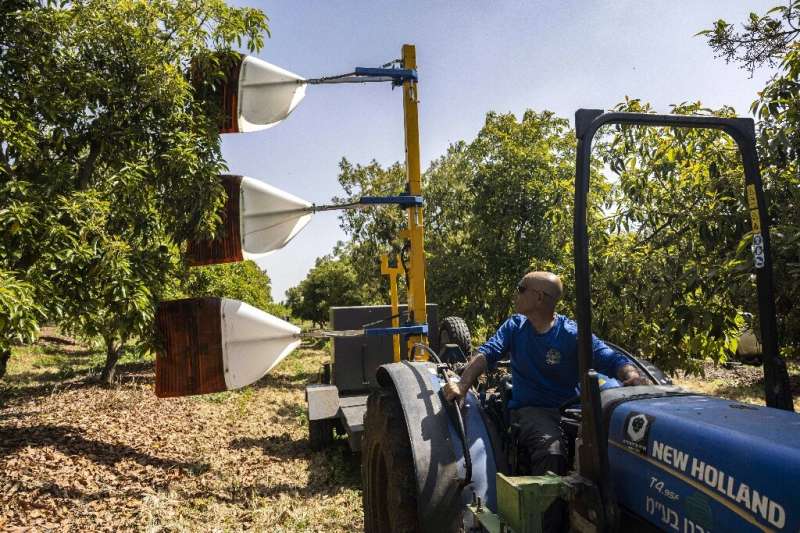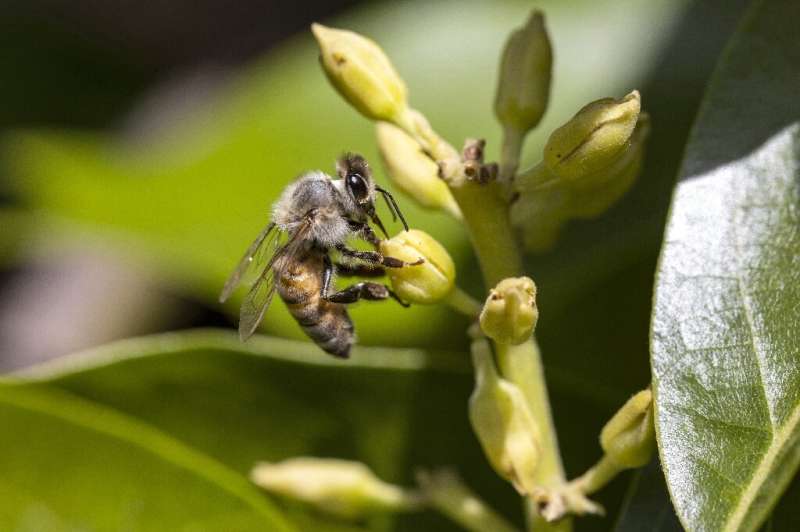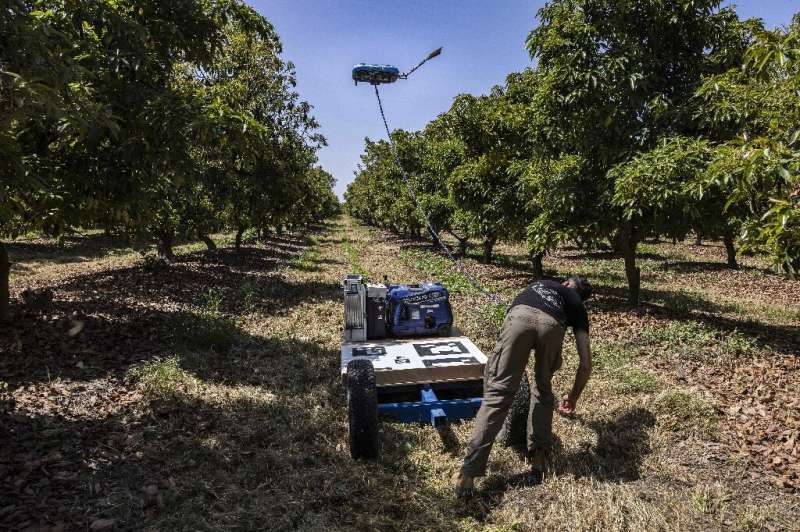
As climate change and global population growth present increasingly difficult challenges for agriculture, Israeli technology offers a plethora of inventive and advanced tools to help farmers adapt.
At an avocado orchard in a kibbutz in central Israel, a tractor slowly moves through the trees, equipped with a device that aids in pollination.
The device, resembling canoe paddles, gently strokes the plants to collect pollen using an electrostatic charge, allowing it to transfer the pollen to the next row of trees.
This artificial pollination method can significantly increase crop yields to support the growing global population, according to Thai Sade, the founder and CEO of BloomX, an Israeli company specializing in this technology.
BloomX uses algorithms to predict the optimal time for pollination, maximizing its effectiveness.
Sade explains, “Our pollination method is designed to address the challenges we currently face, which we anticipate will worsen in the future.” He highlights the scarcity of pollinating insects and the risks posed to them by global warming.
He adds, “It is much more cost-effective to optimize the use of existing orchards rather than establish new ones.”
Ofri Yongrman Sela, responsible for avocado, wheat, and persimmon production at the Eyal kibbutz, states that pollination is the most challenging aspect of his work, given the uncertainties surrounding honey bee availability.
Using BloomX’s technology alongside honey bees has increased yields by up to 40%, according to Sela.

Farming robots
Standing amidst the avocado trees, Yongrman Sela reflects on the rapid changes in agriculture over the past decade.
He notes the integration of sensors to measure soil parameters, drones, and big data, stating that technology has permeated every facet of the industry.
A recent report by Start-Up Nation Central, an NGO promoting Israeli technology, identifies over 500 agri-tech companies in the country.
Shmuel Friedman, from Green Wadi—an agricultural consultancy serving countries in Africa, Asia, and the Gulf—expresses the demand for Israeli technology and expertise.
He says, “We have built a strong reputation in agriculture.” Friedman, a former agriculture ministry official, believes that Israel’s combination of agricultural experience and powerful tech sector can provide numerous technologies to support farmers in the future.
Friedman states that one of the major challenges in agriculture is the scarcity of available labor, especially in developed countries.
He emphasizes the need for alternatives such as robots or machines capable of replacing human workers.

Fruit-picking drones
Over a decade ago, Yanir Maor came to a similar realization while watching a television program featuring 20 Israelis picking fruit alongside the show’s host.
Maor, the founder and head of Tevel, decided to use drones for fruit picking, as there were simply not enough people available for the task.
He states, “And, looking ahead, it’s clear there will be even fewer.”
Tevel’s system consists of eight drones connected to a platform that utilizes AI and machine vision to analyze images of the fruit taken by their cameras.
This technology enables the drones to determine the ripeness, sugar content, and detect any diseases in the fruit.
With gentle suction, the drones detach the fruit from the branches and place them in bins. Humans mainly oversee the operation.
Maor explains, “The system is completely autonomous, from deciding whether the fruit should be picked to determining its color and how to reach and detach it.” Tevel’s technology is currently being used in Israel, the United States, Italy, and Chile on over 40 different types of fruit, including apples, peaches, nectarines, plums, apricots, and pears.
Yongrman Sela, the farmer, believes that the potential of technology to enhance his “primitive” field of work is unimaginable.
He states, “It feels like we’re just at the beginning.”
© 2023 AFP
Citation:
Israel enlists drones, AI and big data to farm for the future (2023, June 28)
retrieved 28 June 2023
from https://phys.org/news/2023-06-israel-drones-ai-big-farm.html
This document is subject to copyright. Apart from any fair dealing for the purpose of private study or research, no
part may be reproduced without the written permission. The content is provided for information purposes only.



